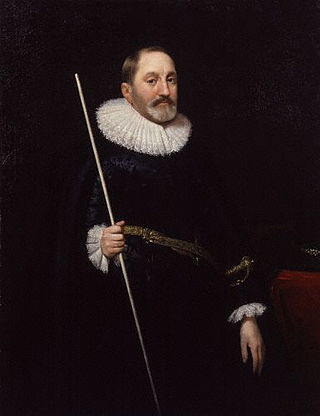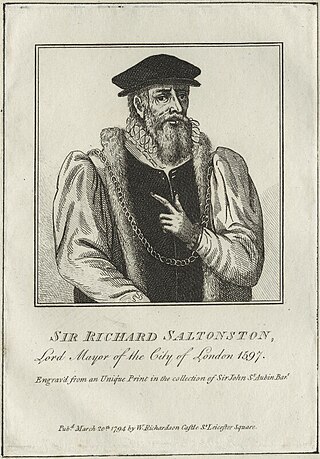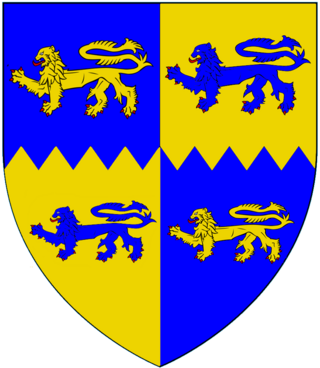Henry Nevill, de facto 9th Baron Bergavenny was an English iron founder, soldier and politician who sat in the House of Commons at various times between 1601 and 1622 when he inherited the Baron Bergavenny peerage.

Sir Henry Maynard (1547–1610) was an English politician and secretary to Lord Burghley, and became a substantial landowner.

Sir William Craven was an English merchant who was Lord Mayor of London in 1610. It has been noted that the story of Dick Whittington has some similarities to Craven's career, though the story was first published before Craven became Lord Mayor.

Sir Thomas Edmonds was an English diplomat and politician who served under three successive monarchs, Queen Elizabeth I, Kings James I and Charles I, and occupied the office of Treasurer of the Royal Household from 1618 to 1639.
John Watts was an English merchant, Alderman and shipowner, active in the East India Company and Virginia Company and Lord Mayor of London in 1606.

Thomas Gerard, 1st Baron Gerard was a Staffordshire and Lancashire landowner and politician, a member of six English parliaments for three different constituencies. Although a prominent member of the Essex faction in the reign of Elizabeth I, he avoided involvement in the Essex Rebellion and received greater honours, including a peerage, in the reign of James I.

Sir Richard Saltonstall was an English merchant and politician who served as the Lord Mayor of London in 1599.

Edward Cromwell, 3rd Baron Cromwell was an English peer. He was the son of Henry Cromwell, 2nd Baron Cromwell by his wife Mary, daughter of John Paulet, 2nd Marquess of Winchester and his first wife Elizabeth Willoughby. His grandfather, Gregory, son of Thomas Cromwell, chief minister to Henry VIII, was created Baron Cromwell on 18 December 1540.
Sir John Garrard, sometimes spelt Gerrard, was a City of London merchant, a member of the Worshipful Company of Haberdashers, a Buckinghamshire landowner, and a Lord Mayor of London for the year 1601 to 1602.

Sir Thomas Smythe was an English merchant, politician and colonial administrator. He was the first governor of the East India Company and treasurer of the Virginia Company from 1609 to 1620 until enveloped by scandal.

Sir Stephen Soame was an English merchant, landowner and politician who sat in the House of Commons in 1601. He served as Lord Mayor of London for the year 1598 to 1599.

Sir Richard Berkeley of Stoke Gifford, Gloucestershire was MP for Gloucestershire in 1604. He had previously served as Sheriff of Gloucestershire in 1564, and as Deputy Lieutenant of Gloucestershire. He was knighted by Queen Elizabeth I in 1568. In 1595 he was appointed Lieutenant of the Tower of London. In 1599 he was appointed custodian of Robert Devereux, 2nd Earl of Essex, who was kept under house arrest at Essex House in London. He died in 1604, whilst serving as MP, and was buried in The Gaunts Chapel, Bristol, where exists an effigy of him, which chapel had been founded in 1220 by Maurice de Gaunt, a member of the Berkeley family, and which stands opposite St Augustine's Abbey, founded by a member of the Berkeley family of nearby Berkeley Castle.
Sir John Leigh was an English landowner, soldier and politician who sat in the House of Commons between 1597 and 1611.
Sir Thomas Berkeley, KB was the son and heir apparent of Henry Berkeley, 7th Baron Berkeley, and a Member of Parliament for Gloucestershire from 1604 until 1611.

Sir Robert Brooke was an English landowner, magistrate, commissioner, administrator and MP who sat in the House of Commons between 1624 and 1629. He made his country seat at Cockfield Hall, Yoxford, Suffolk.
Thomas Colepeper, was an English Member of Parliament.
Sir James Harvey was an English merchant who was Lord Mayor of London in 1581.

Sir Thomas Caesar (1561–1610), judge, was the second son of Dr. Caesar Adelmare, court physician to Queens Mary and Elizabeth, and brother to Sir Julius Caesar.

Sir John Weld was a wealthy landowner and London merchant, the son of a Lord Mayor of London and the father of the branch of the Weld family which became settled at Lulworth Castle in Dorset. He was a charter member and Council assistant of the Newfoundland Company of 1610.
Robert Myddelton was a Welsh politician who served as MP for Weymouth and Melcombe Regis and the City of London in the Parliament of England.













